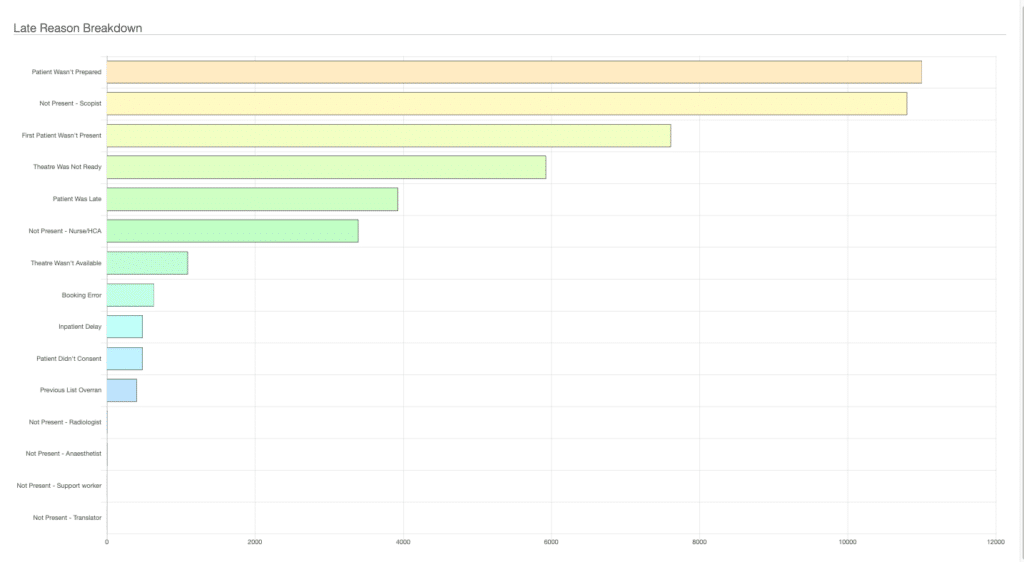The importance of starting on time and the impact of late starts
With THRIVE having been in place in some Trusts for a few years now, we are starting to gain additional insights from the data collected – both in the system and from conversations with those involved in the Rooms. Within this, we have been able to look at the topic of starting lists on time and the impact of starting late. JAG guidance suggests that the actions taken in a ‘4 hour list’ should in fact last approximately 210 minutes – allowing for a total of 30 minutes divided up before and after the list for any paperwork and patient preparation.
In effect, we have observed that this can lead to some confusion around when a list should actually start.
According to JAG, if a list is scheduled to start at 9am this means the patient should be ready to scope for 9am too, not arriving at 9am with delays of paperwork and prep pushing the start time later. Therefore, in order for a list to start on time, a patient needs to have arrived at least 15 minutes in advance of the list start time so that they’re able to provide consent and if necessary change into a gown. During this time ‘before’ the list, nurses and healthcare assistants need to be available to prepare the patient in advance of the allocated procedure start time. In this example preparation would need to begin at 8.45am, and not at 9am.
Using data exclusively from THRIVE in a 3 month period occurring from the 1st May 2023 to the 31st July 2023 we can see that in the North West of England there were 11,987 lists performed. On THRIVE a late reason is required to be input when a list is starting over 10 minutes after its allocated start time, meaning we can record the number of lists starting over 10 minutes late.
In this timeframe there were 7,696 lists starting over 10 minutes late. This number of late starts equates to 64% of all lists on THRIVE starting over 10 minutes late.
Looking further into the data we can also say that in the category of ‘Least Percentage of Late Starts’ the very best performing trust had 40.62% of their lists starting late, meaning even the very best trust can still only achieve 60% of their lists starting on time or early. This indicates that the problem of late starts is not unique to any one trust and is occurring at all locations.
Using this same data we can see that the average list throughout the North West lost approximately 23 minutes due to late starts. If the average list was to finish at the same time during this period yet was able to start when scheduled we could have fit in an extra OGD on every single list, which amounts to nearly 12,000. For July 2023, according to NHS Statistics, there were a total of 7,315 people waiting for a gastroscopy in the North West, meaning in this purely hypothetical situation we could have completely cleared this waiting list by making sure pre-start actions were completed before the list start times.
In addition, the top five reasons for late starts recorded on THRIVE (in the same period studied above) were as follows:
- Not Present – Scopist – 1924
- Patient Wasn’t Prepared – 1647
- First Patient Wasn’t Present – 1294
- Theatre Was Not Ready – 922
- Patient Was Late – 567
Some issues such as ‘First Patient Wasn’t Present’ and ‘Patient Was Late’ are often easy to anticipate but difficult to combat. Only so much advanced work can be done by the hospital to encourage a patient to turn up on time or inform the hospital of their cancellation, but there will always be some patients who neglect to do these things.
Other issues on this list are actionable. Theatres and patients not being prepared in time could be attributed to an understaffed NHS. However, with 2,501 of these lists starting between 15 and 30 minutes late we can see that it would only take small changes while using existing resources to enable earlier start times could make a significant difference.
The most frequent cause for late starts of Scopists not being present in time for the beginning of a list is also the biggest issue facing Trusts on THRIVE. If Scopist preparation is required before the list starts then in some cases either preparation needs to begin earlier or the planned start of the list needs to be adjusted to give the scopist time to prepare correctly. THRIVE can also be used to identify which members of staff record the most late reasons and we are actively working with certain trusts to help them combat this.
In some situations we have also revealed that clearer communication between all staff within a hospital could be improved to deliver a significant improvement all round. When scopists have planned meetings, these need to be clearly communicated to both the nursing teams and the booking teams well in advance, meaning lists are able to be booked correctly and nurses/HCA’s and patients are prepared for the true list start time.
Further to this, In June and July respectively, we also added two new late start reasons to THRIVE to help us monitor and report on the full range of issues that cause a list to start late, these reasons were
- Inpatient Delay
- Previous List Overran
While both these reasons were only added midway through our data timeframe the ‘Inpatient Delay’ option still appears as the 7th highest selected reason with 252 late lists. This is significant as there are a number of different suppliers for Porter Management Systems currently in the UK yet it is still a high impact reason in multiple locations.
While not all hospitals use a porter system THRIVE is able to provide data to those that do on performance of these porter systems in the form of late starts and potentially inpatient cancellations, meaning a hospital can make a more informed decision on whether their porter system is operating as expected or whether another may be more suitable.
All of this data is specific to the nuanced situations in each Trust, Hospital and Room, the people and procedures in question – but as the data grows there are certain trends that are highlighted for further examination – cause and effect can be difficult to determine unless the right data is collected so we are always working to improve the complexity and usage of THRIVE so that these findings can be raised, discussed and potentially resolved.




